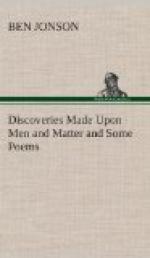“Immortales mortales si fas esset fiere,
Flerent divae Camoenae Naevium poetam;
Itaque postquam est Orcino traditus thesauro,
Obliti sunt Romae lingua loqui Latina.” {146a}
L. AElius Stilo.—Plautus.—M. Varro.—Or that modester testimony given by Lucius AElius Stilo upon Plautus, who affirmed, “Musas, si Latine loqui voluissent, Plautino sermone fuisse loquuturas.” And that illustrious judgment by the most learned M. Varro of him, who pronounced him the prince of letters and elegancy in the Roman language.
Sophocles.—I am not of that opinion to conclude a poet’s liberty within the narrow limits of laws which either the grammarians or philosophers prescribe. For before they found out those laws there were many excellent poets that fulfilled them, amongst whom none more perfect than Sophocles, who lived a little before Aristotle.
Demosthenes.—Pericles.—Alcibiades.—Which of the Greeklings durst ever give precepts to Demosthenes? or to Pericles, whom the age surnamed Heavenly, because he seemed to thunder and lighten with his language? or to Alcibiades, who had rather Nature for his guide than Art for his master?
Aristotle.—But whatsoever nature at any time dictated to the most happy, or long exercise to the most laborious, that the wisdom and learning of Aristotle hath brought into an art, because he understood the causes of things; and what other men did by chance or custom he doth by reason; and not only found out the way not to err, but the short way we should take not to err.
Euripides.—Aristophanes.—Many things in Euripides hath Aristophanes wittily reprehended, not out of art, but out of truth. For Euripides is sometimes peccant, as he is most times perfect. But judgment when it is greatest, if reason doth not accompany it, is not ever absolute.
Cens. Scal. in Lil. Germ.—Horace.—To judge of poets is only the faculty of poets; and not of all poets, but the best. Nemo infelicius de poetis judicavit, quam qui de poetis scripsit. {148a} But some will say critics are a kind of tinkers, that make more faults than they mend ordinarily. See their diseases and those of grammarians. It is true, many bodies are the worse for the meddling with; and the multitude of physicians hath destroyed many sound patients with their wrong practice. But the office of a true critic or censor is, not to throw by a letter anywhere, or damn an innocent syllable, but lay the words together, and amend them; judge sincerely of the author and his matter, which is the sign of solid and perfect learning in a man. Such was Horace, an author of much civility, and (if any one among the heathen can be) the best master both of virtue and wisdom; an excellent and true judge upon cause and reason, not because he thought so, but because he knew so out of use and experience.




